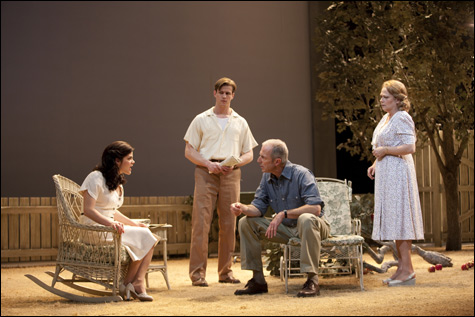
ALL MY SONS: The Huntington’s blistering performance of this 1947 drama proves it’s Miller time in America once again. |
It's hard to imagine being dwarfed by the titanically insignificant Willy Loman. But Arthur Miller's 1947 drama All My Sons has always existed in the shadow of the salesman with the smile, the shoeshine, and the gas pipe who followed it to Broadway two years later. David Esbjornson's revival for the Huntington Theatre Company (at the BU Theatre through February 7) brings out not just the Ibsen but also the O'Neill in the earlier work — an examination of moral choice versus brute greed in wartime that could not be more relevant if a cabal of Halliburton executives with thespian aspirations performed it. Thank God they don't, since that would deprive us of emotionally overwhelming turns by Karen MacDonald and Will Lyman as Kate and Joe Keller, a prosperous mom and pop who have survived one devastating loss, then barred the barn door against nasty chickens coming home to roost.
The play is set, in the wake of World War II, in the Kellers' back yard. In a prologue added by Esbjornson, Kate mans the screen porch in a fitful doze as, on a vast cyc, projected images of the Andrews Sisters blithely warbling "Don't Sit Under the Apple Tree" are followed by planes going down. A storm kicks up, and an apple tree planted in honor of the family's MIA son, Larry, is cleft before our eyes, whereupon it dumps its ripe fruit about the yard. Well, no one said Arthur Miller was subtle.
Kate, who ferociously refuses to accept the death of her pilot son three years earlier, regards the Providential destruction of his premature memorial as an omen brought about by the recent return of Larry's girlfriend and their former neighbor, Ann Deever, to be proposed to by younger son Chris. "Everything that happened seems to be coming back," Kate remarks, ushering in both the trajectory and the theme of a play in which old guilt will be swept out from under a plush rug of complacency and denial and no one's motivations are pure and simple.
Miller, like so many liberals of his era, believed adamantly in the social contract that Joe Keller subrogates to family values. During the war, Keller's factory sold the Army a shipment of cracked airplane-engine cylinder heads — a crime with fatal results, for which Joe's partner (who's also Ann's father) took the rap. Joe has always maintained that he didn't authorize the transaction — and that, whatever he may or may not have done, it was for his wife and sons. In the course of the play, this canny, self-made powerhouse must finally shoulder accountability; his wife must relinquish her sustaining illusion; and son Chris, who returned from a black-and-white war to the profitable murk of the family business, must acknowledge the limits of his own posturing idealism.